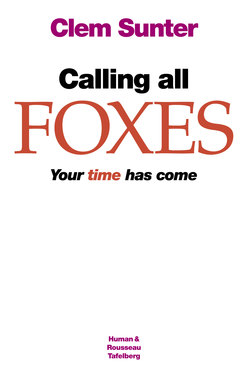Читать книгу Calling all Foxes - Clem Sunter - Страница 6
На сайте Литреса книга снята с продажи.
ОглавлениеSmall is really beautiful
You will see that small business is a recurring theme in this book. Its encouragement requires a change of heart from the powers that be.
Let a million small businesses bloom. I know this sounds Maoist, but it is a lot more inspirational and realistic than saying “we are going to create another five million jobs by 2020“. The latter implies that you are in control of the situation: if you target a high economic growth rate, add a public works programme here and there and select one or two industries that are in the public eye like green technologies, the result is assured.
Actually our economy is closely correlated to the performance of the world economy. When the world booms, we boom. When the world goes through hard times, so do we. Yes, it would seem that we are moving into a two-speed world where emerging economies will grow three times faster than advanced economies. Nevertheless, it would seem that we are caught somewhere in the middle – we will grow faster than Europe but we won’t grow as fast as China, India and the rest of Africa. We are not a cheetah but nor are we a tortoise. I guess we’re a buffalo which is quick when it wants to be but can be chased down by other animals.
All this adds up to the fact that, in the current global environment, a goal of 6 to 7% economic growth is pretty stiff for South Africa. For that is the rate that many economists quote is necessary to lead to significant job creation. It may happen but, in my book, it would only be in a scenario of a renewed economic boom for the world as a whole.
Meanwhile, we cannot just sit on our hands and hope for the best. Two statistics suggest that we have to do something which is radical and far-reaching. The first is that there are 14 million South Africans on welfare and only five million taxpayers. The second is that the unemployment rate among 18–24 year olds is 42%.
My recommendation – and I have been making it for a long time – is that we have to create a whole new environment in South Africa which is favourable for entrepreneurs. My 2020 vision is for rural and urban communities to be teeming with small businesses, buying and selling from and to each other; and this activity is the key driving force behind the African renaissance rather than the expansion of government and big business. Obviously you need effective government and a thriving big business sector to make it all happen. But the focus is on empowering ordinary people to do extraordinary things.
The word “job“ implies subservience to someone else. Five million jobs conjure up the picture of five million “employees“ in hard hats slaving away in the sun on grandiose projects selected by some well-meaning committee full of policy zealots. “We know better than you,“ they smugly say. “At least you have work now and belong to a trade union.“ In other words, it is a collective vision based on the “Walk Behind“ scenario where the common people walk behind the so-called elite or, as George Orwell put it, some animals are more equal than others.
The alternative, as the Old Mutual Dinokeng scenario exercise suggests, is to walk together where the majority of citizens choose their own direction in a framework that supports them to do so. They don’t walk apart because there is enough synergy in the system for them to want to walk together voluntarily.
Intellectually and spiritually, the idea that small is really beautiful is so far apart from the way we conduct ourselves today, where public/private partnerships essentially mean political and business leaders deciding what is good for everybody else. An entrepreneurial society is a truly democratic society where the economy grows organically as a result of the millions of smart business decisions made by individuals who are both liberated and empowered.
At least, let us have a debate now about which is the best vision before committing ourselves to a new path.
